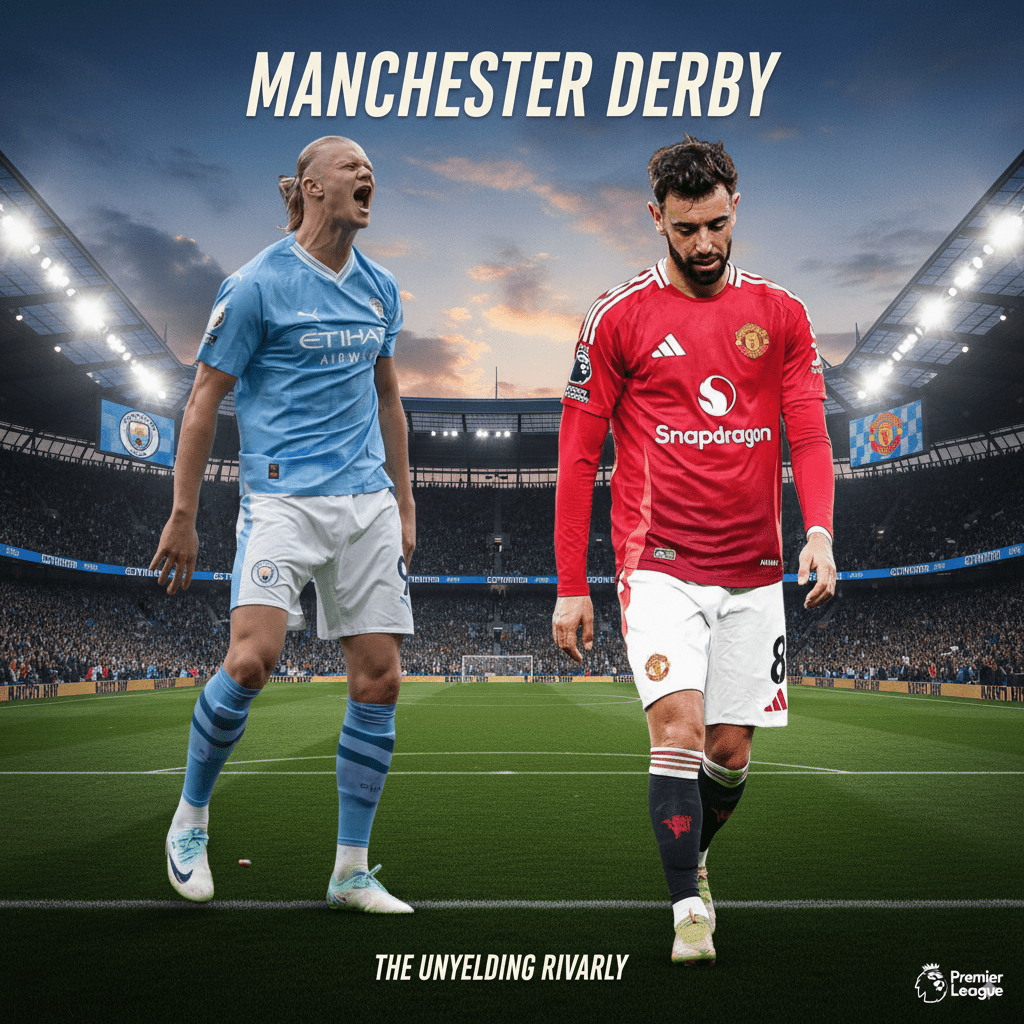A Post-Mortem of the Manchester Derby: Tactical Breakdown and What it Means for Both Clubs
The Manchester Derby, a fixture steeped in history and intensity, delivered a result that will reverberate across the city and the entire Premier League. Manchester City's commanding 3-0 victory over their rivals was not just a win; it was a tactical masterclass and a stark reminder of the chasm in quality and cohesion between the two clubs. This comprehensive post-match review dives into every aspect of the game, answering the questions every football lover is asking.
The Big Picture :Dominance and Disappointment
The final scoreline of 3-0, with goals from Phil Foden and a brace from Erling Haaland, accurately reflects a match where one team was in complete control. While Manchester United had moments, they were largely reactive, with their fate sealed by a combination of individual errors and systemic tactical failures. City, in contrast, looked resurgent, shaking off their recent slump and displaying the ruthless efficiency that has defined Pep Guardiola's reign. The result piles immense pressure on United's manager, Ruben Amorim, whose side has now taken just four points from their first four league games.
Player Performances: Who Shone and Who Struggled?
Man of the Match: Erling Haaland. While Foden's opener was crucial, Haaland's two goals and constant threat were the difference. He was immense, not just in his finishing but in his link-up play, hold-up work, and tireless pressing. He looked back to his best, a terrifying prospect for the rest of the league.
Manchester City Standouts: Phil Foden was a constant menace, and debutant goalkeeper Gianluigi Donnarumma made a crucial save at 2-0 that prevented any semblance of a United comeback.
Manchester United Struggles: On a difficult day, Luke Shaw had a shocker. He was at fault for the opener and struggled to contain the blistering pace of Jeremy Doku. Debutant striker Benjamin Sesko looked out of his depth, and Harry Maguire's misplaced pass directly led to City's third goal. The midfield pairing of Bruno Fernandes and Manuel Ugarte was swamped, unable to cope with City's numerical advantage and relentless movement.
5 Tactical Mistakes That Decided the Manchester Derby
This was a game won and lost on the training ground. The following tactical blunders, particularly from the Manchester United side, were the key to the final outcome.
Defensive Line Positioning Errors That Exposed Key Weaknesses High Line Vulnerability Against Counter-Attacks: United's attempt to play a high line left them exposed, particularly against the speed of Haaland and Doku. They were frequently caught out by through balls, and their failure to adequately cover the space in behind was a recurring problem.
Poor Communication Between Center-Backs: There was a clear lack of cohesion. For Foden's opening goal, the miscommunication between the defensive line and the midfield created a gaping hole that City expertly exploited.
Failure to Track Runners From Midfield: was perhaps the single biggest tactical error. Foden's free run into the box for the first goal was a direct result of this, as Bruno Fernandes failed to track his man. This is a recurring issue and a major concern for the team.
Inadequate Coverage on Set-Piece Situations: While City didn't score from a corner, their threat was palpable, and United looked vulnerable on every set piece, reinforcing a pre-existing weakness.
Midfield Control Breakdown That Shifted Game Momentum
Losing the Battle for Second Balls: City's midfield, led by the imperious Rodri, completely dominated the middle of the park. They were quicker, more aggressive, and consistently won the crucial second balls, allowing them to maintain pressure and recycle possession.
Ineffective Pressing Triggers: United’s pressing was uncoordinated and disjointed. Individual players would press high without the support of their teammates, leaving vast open spaces for City to pass through with ease.
Poor Transition from Defense to Attack: Once they won the ball back, United were too slow to transition. Their passes were often misplaced, and they failed to capitalize on the moments of vulnerability they created in City's half.
Wide Play Tactical Blunders That Created Goal-Scoring Opportunities
Overlapping Full-Back Timing Issues: While United's fullbacks tried to get forward, the timing of their runs was off. They were often caught up the pitch, leaving acres of space on the flanks for Doku and Foden to exploit.
Wing-Back Positioning During Defensive Phases: In United's 5-4-1 defensive shape, the wing-backs were often caught too high, failing to drop back and form a cohesive backline. This allowed City to create dangerous overloads in wide areas.
Game Management Decisions That Sealed the Final Outcome
Substitution Timing and Player Selection: Amorim's substitutions seemed to come too late to change the course of the game. The team was already on the back foot, and the changes failed to provide the desired impact.
The Manchester United Perspective: A Club in Crisis
This defeat is more than just three points lost; it's a reflection of deeper, systemic problems. The team's lack of tactical cohesion and individual errors point to a lack of confidence and a manager who, despite his track record, is struggling to implement his philosophy. The chants of "sacked in the morning" from the away end were a clear message from the fans. The question is no longer "if" things need to change, but "when" and "how." This result makes the upcoming fixture against Chelsea a must-win, or the pressure will become unbearable.
The Manchester City Perspective: A Resurgent Force
For City, this was a statement victory. After two consecutive league defeats, they looked every bit the title contenders they are. The performance was a huge boost to their momentum, and the individual brilliance of Haaland and Foden shows they have the firepower to go toe-to-toe with anyone. While some weaknesses may have been exploited in previous matches, they were largely absent here. This result signals a return to their previous dominance and puts the rest of the Premier League on notice.
Conclusion: A Tale of Two Cities
This Manchester Derby was a microcosm of the current state of both clubs. One, a well-oiled machine operating with tactical precision and individual brilliance. The other, a team in disarray, plagued by a lack of identity, communication, and confidence. For United, the road ahead is a difficult one. For City, the victory is a timely reminder of their class and a sign that they are back in the title race. The rivalry continues, but on this day, there was only one winner, and the tactical analysis reveals exactly why.
Leave a comment
Your email address will not be published. Required fields are marked *




